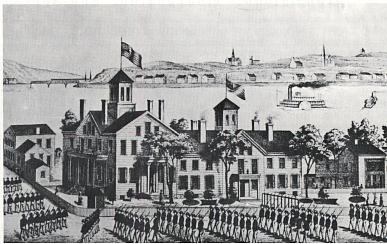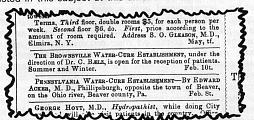
Return to Milestones Vol. 5, No. 2

In the files of the Great Arrow Historical Association is a paper entitled The Water-Cure Journal, published in 1852. The practice of medicine and the healing arts was a long way from its present state of enlightenment in that year, and any theory or substance that proposed to restore health to an injured or diseased person was eagerly seized upon by the victim or his loved ones. Lingering pain and eventual death were all too common despite the best efforts of the physicians of the time.
And so resulted the practice of hydropathy, which meant, literally, "water treatment", or the therapeutic use of water. A classified advertisement on the 32nd and last page of the journal explains why we are interested in this subject at this time:

The community of Phillipsburg mentioned in the advertisement is the Monaca of today. Not very much is known about Dr. Acker's Water-cure establishment, except that it was founded in 1848 in a building erected by the New Philadelphia Society, probably in 1833. The sanitorium stood where the Borough's water pollution control center now stands, opposite the German Lutheran Cemetery on Pennsylvania Avenue Extension. By 1856, when the Borough's Post Office was established, it was called "Water Cure" and was located in the sanitorium. Dr. Clement Baelz, who succeeded Dr. Acker as proprietor, was postmaster. (The name of the borough, "Phillipsburg", could not be used as a post office name because there was another town of the same name in the state. In 1892, both names were changed to "Monaca.")
We don't know what happened to the sanitorium, which might be considered Beaver County's first hospital, but the buildings were operated as a hotel sometime in the 1860's, then in 1865, became the Phillipsburg Soldiers Orphans School. Founded by Rev. William Taylor, this popular and successful institution was destroyed by fire in 1875.
Hydropathy was presented as a reliable treatment, if not a cure, for every conceivable type of infirmity. The following accounts illustrate the variety of ways in which water was used to restore health. Most of the procedures seem to have been harmless or even mildly beneficial.
"Among the kind of miracles which I have seen wrought by water, in the wounds from fire-arms, I will instance the cure of nearly sixty young volunteers of a battalion called 'Louvre, which, having left Paris on the first day of December, 1782, was ordered on Christmas day to the Assault, upon Montague-berte, near Greves. The enemy placed upon a height, made upon the battalion a well-sustained fire, and most of these young men were wounded in their feet. Many were taken to the military hospital of Sarrelouis, of whom only a few could be saved without amputation. The others remained in the convent of Consarrebruck, with two German surgeons, who were charged with their care. By my advice, and, perhaps, in defeault of other remedies, the attendants bathed their feet incessantly, and showered them with water moderately cool, covering theIr wounds with compresses constantly moistened with the same. No other dressings were used, and I attest that only four died, of whom two died of adynamic fever, which disturbed and interrupted the treatment of the wounds with water; one of colliquativediarrhoea, and the fourth of tismus. All the other recovered rapidly.
SIMPLE INFLAMMATORY FEVER.-In the latter part of September, 1851, 1 attended a case of simple, inflammatory fever in the city of New York, which was completely "broken up" within a very few days. The patient was quite a young man, of good constitution, and free from organic disease. I was not called at the outset of the attack, or in all probability it could have been broken up sooner; still, the case as it was, was a highly satisfactory one, and proved conclusively that it is as practicable to employ water in the treatment of acute complaints as the ordinary allopathic or homoeopath1c remedies, without incurring the necessity of resorting to an establishment. The treatment pursued in this case was strictly in accordance with general principles. The leading object was cooling down the great heat; and this was accomplished by means of the half-bath or the plunge. Wet bandages were also enjoined, together with water-drinking, low diet, enemata, Etc; and, as I have before observed, recovery was rapid.
PAROTITIS, OR MUMPS. -The prevalence of the disorder familiarly known as "the Mumps" in this vicinity, as we/1 as elsewhere, for some time past, induces me to mention a strongly marked case of it, complicated with high fever, which I attended in New York about the middle of the month of March, 1850. The patient was a boy of five or six years of age, whose parents were strong believers in Hydropathy, having both experienced the benefits of water treatment in chronic disease to an unusual degree. Their residence was a remarkably elegant one, in the upper part of the city, and the bathing facilities which it afforded were adequate to the encounter of any ordinary attack of disease. The treatment I prescribed was both general and local; consisting principally of the rubbing wet-sheet, the wet-sheet packing, the half-bath, wet bandages around the inflamed glands, clysters, Etc.,Etc. Under this plan, the feverishness of the system was effectually subdued, and the attack subsequently passed off as mildly as could have been desired. The employment of cold did not tend in the least to effect any transfer of the disorder; and I am fully of the opinion, that no dangerous metastasis will result in the employment in this, or in any other disorder, whenever the practitioner is careful enough to commence with general instead of local treatment. A great deal more depends upon making a strong impression upon the whole of the external mucous membrane than is commonly supposed.
GENERAL DEBILITY. -A gentleman about thirty-five years of age, commenced the water treatment under my direction in August, 1850, for the relief of general debility, accompanied with a hard, constant, wearing cough; and finding that the wet-sheet packing, halfbath, shower-bath, &c., effected an immediate change for the better, continued their employment for about three months with decided benefit. Subsequently a daily bath sufficed to ensure a more vigorous state of health than he had enjoyed for years, and to enable him to prosecute successfully the engrossing duties of a commercial career. Indeed, during the whole of the time that he was under my treatment, he was able to devote the better part of each day to the pursuit of his business. The principal point of interest to be drawn from this case, is the efficacy of judicious water-cure management in maladies requiring a tonic, building-up treatment, and especially in instances of threatened decline, like the one just described. The gentleman I refer to was commonly supposed by his friends to be fast sinking into the grave at the time when he commenced the treatment by water; but their melancholy forebodings, I am happy to say, were doomed to be speedily and agreeably disappointed. At the present time of writing, to the best of my knowledge, he is in the enjoyment of good health.
The Water-Cure Journal is emphatic and persistent in denouncing "allopaths", or doctors who attempted to cure their patients with drugs, herbs, potions, lotions, and "physicks". In 1852, the hydropaths were probably correct, for the most part, because there was very little scientific knowledge available about either the disease or their supposed cures, and drug treatments were based on Indian herb remedies, "old wives' tales" or pure chicanery.
It is the extensive use of drugs that has made sallow countenances, shattered constitutions, and early graves gain the reputation of being characteristic of Western life. It is not malaria, hot summer suns, or sudden changes of weather, that cause such fatality. All these causes operate, I admit, to produce functional derangement of the system, but were not its integrity undermined by physic and bad habits, it would have no difficulty in successfully resisting them. Let Nature be trusted, and "throw physic to the dogs, " whether it be dealt out "by authority, " or by a quack. There safety lies, and nowhere else; for the tread-mill of drugmedication, once in motion, ceases its revolutions only with the death of its victims. Total abstinence from all drugs-must be the motto of western men, and an earnest study of, and hearty obedience to physical laws, their every day task. First, "cease to do evil; then, "learn to do well."- [ Glen Haven Water- Cure. ]
The Journal includes a lengthy list of "Water-Cure" publications offered for sale. Among them:
Confessions and Observations of a Water-Patient, by E. Lytton Bulwer.
Curiosities of Common Water. With Rules for Preserving Health. 12 1/2 c.
The Parents' Guide for the Transmission of Desired Qualities to Offspring, and Childbirth made Easy, by Mrs. Pendleton. 50c.
The bulk of the "Water Cure Journal" is taken up with enthusiastic endorsements from persons cured by hydropathy, lengthy treatises describing new theories and practices of medicine, and a wealth of bits and pieces of wisdom (and fallacy, too):
-People who are deprived of sunlight grow like potato vines in a cellar. Darkness is the cause of many fatal diseases.
-No air Is fit to breathe which has been breathed before, unless it has first mingled with the whole body of the atmosphere. It takes all the vegetables of the earth to purify the air that the animals corrupt.
-Health comes from obediance to natural laws; disease is the result of their violation.
- Clothing should give sufficient warmth, freedom of motion and free transpiration. Feather beds, cotton comforters, oil-cloth, and India-rubber clothing are civilized abominations.
- The time is at hand when a violation of the physical laws is to be regarded as no less sinful than the violation of the moral laws.
The discovery and advancement of the germ theory of disease, plus development of reliable pharmaceutical treatments put most of the desperate medical practices to rest. Hydropathy might have contributed a few small benefits to the body of modern medicine, but it remains, for the most part, just a brief, interesting chapter of Beaver County history.